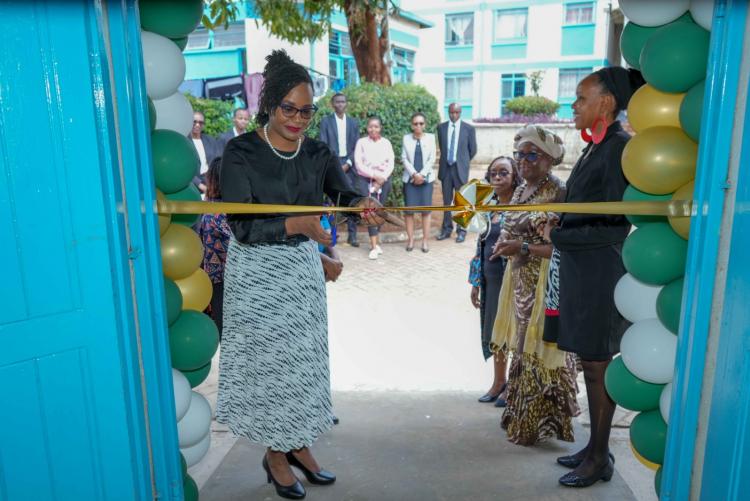The Faculty of Law held its 3rd Annual Conference 2024, which included the Women’s, Children’s, and Nature’s Rights in Environmental Governance (WCNREG) Conference as a significant component. The overall theme of the conference was Emerging Research and Technologies for Sustainable Development in Society. The WCNREG conference took place on Thursday, October 31, 2024.
The Women, Children and Nature Rights in Environmental Governance (WNCREG) Conference served as a pivotal platform for discussions surrounding the critical intersections of gender, environmental governance, and the rights of marginalized communities in Africa. The conference attracted esteemed speakers and participants from diverse backgrounds, including academia, government, and civil society, fostering rich dialogue on how to integrate the perspectives of women and children into environmental policymaking and action.
The event also included the official launch of the WCNREG office at the faculty.
Hon. Roseline Njogu, Principal Secretary of the State Department for Diaspora Affairs, delivered compelling remarks highlighting the importance of gendered perspectives in environmental governance. Drawing on her extensive research on "wifehood and power," Hon.Njogu underscored how understanding the dynamics of women's rights is essential for comprehending family and societal relationships. She emphasized that climate change is increasingly driving migration, particularly impacting women employed in vulnerable sectors like domestic work. Her discussion of the State Department's initiatives aimed at safeguarding Kenyan migrant workers, particularly in high-risk areas such as the Middle East, showcased a proactive approach to mitigating the distress faced by women migrants. The PS urged for collaboration among academics and researchers to explore the intersections of migration, climate change, and women’s rights, emphasizing the need to prioritize long-term impacts for future generations.
The conference featured key note presentation by Prof. Patricia Kameri-Mbote, UNEP’s Law Division Director, who addressed the urgent need for a more inclusive and sustainable approach to global environmental governance. She spoke on the "Path for the Future," an intergovernmental initiative designed to reinforce commitments to sustainable development while addressing pressing global challenges like climate change and biodiversity loss. Prof. Kameri-Mbote called for a transition away from fossil fuels and emphasized the necessity of integrating gender equality and the active participation of indigenous communities into new international frameworks. Her advocacy for the "environmental rule of law" highlighted the importance of embedding rights for nature and human rights within legal frameworks, thereby preventing the marginalization of vulnerable populations, especially women and children.
Prof. Winfred Kamau, Dean of the Faculty of Law, articulated the University of Nairobi’s ongoing commitment to impactful research and community engagement. She acknowledged the support of the Norwegian Agency for Development Cooperation (NORAD) for the WNCREG program and celebrated the establishment of the WNCREG Centre, which notably includes a lactation room—a first for the university. This initiative underscores the faculty's commitment to fostering a supportive environment for women and families within academia.
Associate Dean Prof. Collins Odote further reinforced the significance of integrating diverse perspectives into environmental governance. He discussed the interdisciplinary efforts underway at the Faculty of Law, supported by NORAD, aimed at cultivating a new generation of African leaders equipped to tackle the climate crisis while preserving cultural values. The Faculty’s commitment to launching cross-disciplinary programs reflects a holistic approach to addressing environmental governance, emphasizing the necessity of viewing nature as a partner rather than an object in governance discussions.
The conference also showcased a variety of presentations on pressing issues affecting women, such as rural water access and climate-smart agriculture. A notable contribution explored water governance in Kajiado County, demonstrating how empowering women in water management committees significantly improved access to this critical resource. Additionally, discussions on climate-smart agriculture emphasized the essential roles of women farmers and the need for policies that acknowledge their agricultural knowledge and resilience strategies.
In conclusion, the Women, Children and Nature Rights in Environmental Governance Conference was a significant step toward promoting inclusive and sustainable environmental governance in Africa. The discussions and insights shared during the event reaffirmed the critical importance of prioritizing the voices and rights of women and children in the face of environmental challenges. As participants departed, there was a collective commitment to translate the conference's discussions into actionable strategies that uphold the rights of marginalized communities, ensuring that future generations inherit a sustainable and resilient environment. The University of Nairobi remains dedicated to leading these efforts through impactful research, collaboration, and a focus on societal solutions.

